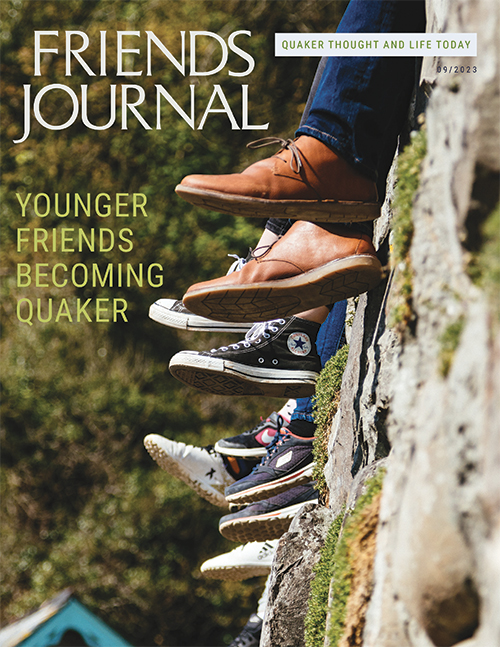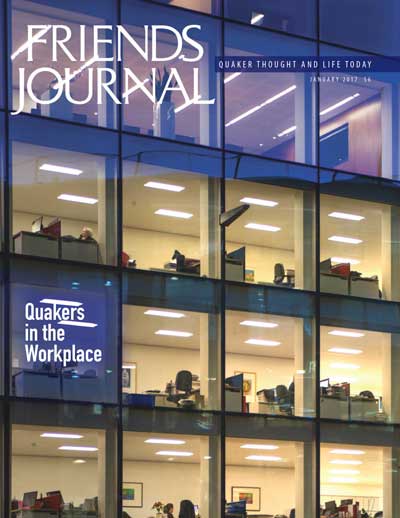Changing meeting memberships
Andy Stanton-Henry’s “Three Common Fallacies of Quaker Leadership” (FJ June-July) is a great article, informative and helpful. I recommend its wise words for every meeting in Quakerdom.
Gerard Guiton
Alstonville, Australia
Excellent article and spot on for what ails many meetings, my own especially! As we transition from pandemic isolation to community worship and practice, it is critical that we re-examine our established responses to changing meeting membership and shifting cultural influences. Such policies or practices can be manipulated by these fallacies to create stasis and permanent advocacy without action both inside our meeting and in the larger community beyond our doors.
Chuck Slayton
Pittsburgh, Pa.
Other venues for Quaker leadership
What a wonderful concept in Sharlee DiMenichi’s “Distinguishing Audacity from Hubris” (FJ June-July online): “the difference between audacity and hubris and the difference between being humble and being resigned.” This was a helpful and encouraging article.
Donna Hartmann
Bethlehem, Pa.
Though it is interesting and important to hear how and what Quaker leaders perceive and do within their organizations, I can’t help but wonder about relevance. Are Quaker leaders in Quaker organizations not just paddling about in puddles that are growing smaller and smaller? The number of Quaker leaders outside of Quaker organizations is presumingly far greater, yet receive very little recognition or support from the Quaker hierarchy. For example, how about those Quakers who teach outside of Quaker schools? How do they go about making a difference, and what kinds of differences do they want to make? Despite this lack of Quaker organizational support, I tried to maintain what I perceived as a Quaker approach in each of my very different schools. Have queries been developed to address this population (not just educators), and how does Friends Journal bring forth discussions resulting from such introspection?
Jay Dewey
Raleigh, N.C.
Healing a community
The video “Healing from Abuse in Quaker Communities” featuring Windy Cooler (QuakerSpeak.com, June) is such important stuff—this work of healing an entire community rather than “just” an individual (not trying to minimize the importance of the individual’s work). “The problem of having no time” just rings out.
However, I think I loved this video because I’d heard Windy recently at the 2023 Friends General Conference Gathering so knew precisely what she is talking about; the video might be a bit too vague, and would benefit from some specific story to make it more powerful.
Julie Peyton
Portland, Ore.
Living into Quakerism, honestly
I have a book on my bookshelf, actually not all that great a book, but the title grabbed me: A Hunter’s Heart (“Allowable Diversions” by Timothy Tarkelly, FJ Aug.). My father, who came from a long line of bad Quakers but good people, hunted, and said of it, “Some justify it as conservation. I do it to see the blood run.” This honesty is for me the best of Quakerism. My grandfather, who had left his Quakerism for the Congregationalists, stood up in front of his congregation and said, “I no longer believe in God, and I am leaving the Congregation.” He had not left his Quakerism; he lived it. The human spirit cannot be contained in human institutions, whatever the ilk of that institution. Only the silent unknowingness of worship can hold our complexity, aggression, and love of running blood included.
Lucinda Antrim
Scarsdale, N.Y.
Tales of hitchhiking
I was moved by Kat Griffith’s “Hitchhiking as a Spiritual Discipline” in your August 2023 issue. For me, too, hitchhiking in the United States in the 1960s and Europe in the early 1970s was a key part of my spiritual development. I found many people who were living exemplary Quaker-like lives, but they had never heard of Quakers (this was very reassuring for our troubled world). Like Kat, I did not suffer a traumatic experience, and like her I shared in the thrill of the next ride.
Along the way I learned: the humbler the car, the more likely the ride; the best rides were between first light and sun up; the farther north the better (I once waited 24 hours for a ride in Greece). I also learned that the generosity of kind givers-of-rides can be astonishing, sometimes transforming a simple transaction for transportation into a good life-changing experience. Waiting patiently by the side of the road with your thumb out can be a lot like the patient waiting during meeting for worship.
I gave up hitchhiking after I got my first job and gave up picking up hitchhikers when I had my first car.
For me hitchhiking was a risk worth taking to see the world through others’ eyes. It gave me a lifetime of fabulous memories, especially precious now in our current, less-trusting era where hitchhiking has almost died out.
Steve Elkinton
Philadelphia, Pa.
This speaks to my condition and teen to late 20s lived experience! I once got a single ride from Athens, Greece, to Salisbury, UK (more than 2,000 miles). It helped to have my destination on my sign—my ride (a family) told me they never had picked up a hitchhiker before but our common destination made them stop. It was instantly a mobile community of mutual support, and I’m still in touch with their daughter whom I entertained in the back seat. I now live in a campervan and am traveling all over North America on a fairly random schedule. I’m more relaxed, grounded, listening, and aware on a daily basis than when I was conventionally housed. My hopes for the country, planet, and humanity were battered in recent years. I can’t say that they are restored, but they are more optimistic and maybe more realistic now. I connect more with the Divine and my faith and notice the random yet purposeful showing up of daily miracles more than ever.
Margaret Wood
Wyalusing, Pa.
Thanks for Kat Griffith’s article on hitchhiking in your August issue. I also used to hitchhike a lot. It was often my main mode of travel back in the 1960s and ’70s, from age 17 to age 37. I have a lot of hitchhiking stories in my old diaries. (I never got a driver’s license, partly because of my defective eyesight.)
I later figured that I had probably hitchhiked over 75,000 miles, including a number of times from coast to coast in this country. I did this throughout the years when I was the most angry at, and alienated from, mainstream U.S. society. A spiritual slant on it, as Kat implies, was that I was continually asking people to do me a big favor, and they were consenting and doing the favor for me.
Thinking back on all of that in later years, I wondered whether the ability to hitchhike for long distances in this country was a form of White privilege. I’m thinking of the African American man in Texas back in the 1990s who I believe was hitchhiking, and got picked up by some White racists who tied him to the back of their truck and dragged him to his death. I am also mindful of the very moving article called “Who Gets to Be Safe?” in the same issue of the Journal about the sharp differences demonstrated in one Friends meeting between the feelings of safety of African Americans and those of European Americans.
Jeff Keith
Philadelphia, Pa.
Instead of being the one sticking a thumb out for a ride, I was the one driving the car and picking up the hitchhiker! I think it can be dangerous both ways, but God was with me throughout my journey and I learned a spiritual lesson.
In 1973 one of my friends graduated from medical school at the University of North Carolina in Chapel Hill. She got an internship at a hospital in Los Angeles, Calif. She needed help moving so I agreed to drive my car alongside hers to take everything. We decided that we would enjoy the trip by making stops along the way to sightsee in different states. Once my friend was settled in, I decided that I had so much fun, I would continue up the coast to Vancouver, British Columbia, and return to North Carolina by crossing the Canadian Rockies.
I picked up hitchhikers all along the way, and everyone was nice. I never thought about the danger because I was too young to be fearful. Yet God was with me on every mile. At one point in the Canadian mountains, I pulled over along the side of the road because I was falling asleep. A policeman saw me and said that I could not park alongside the road. I told him I was falling asleep, and he said that he would follow me to the next town, so I could get a hotel. I was so grateful. There was another instance whereby I was running out of gas, and no towns were in sight. I prayed as I looked at the gas gauge and asked God to help me. Shortly thereafter I drove down into a valley and found a gas station. The town was so small there was no hotel, so I decided to keep driving. It was about one or two in the morning, and in the darkness I saw a hitchhiker. I stopped and picked him up. I asked him to help me stay awake until we could find a hotel. We talked and a friendship developed. We finally found a hotel and we shared a room. I never had any fear that he would harm me or steal from me, and he did not.
The next morning I drove and dropped him off at his destination and continued on another week before returning to the eastern coast of North Carolina. I always felt that God was with me. That experience strengthened my faith and taught me a lesson about grace. Grace is given freely and was bestowed upon me during my journey across the country and through the Canadian Rockies.
So whenever I hear the words of the song “I’ve Come This Far by Faith,” they have a special meaning for me.
Chester Freeman
Rochester, N.Y.
The author replies: Thank you, Chester! I too have picked up hitchhikers. My favorite one was a guy who hitchhiked all the way from South Carolina to New Hampshire to visit his mother on Mother’s Day! I was so touched at his dedication that I drove him home, about an hour out of my way to make sure he got there with time for a proper visit before returning. I’m glad you too had good experiences and your trust was rewarded!
Kat Griffith
Ripon, Wis.
Correction
William Shetter’s review of Mark Russ’s book Quaker Shaped Christianity (FJ Aug.) stated that Russ grew up in the fundamentalist tradition. This is not true; he grew up in a non-religious family.





Comments on Friendsjournal.org may be used in the Forum of the print magazine and may be edited for length and clarity.